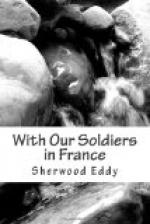At the beginning of the war in 1914 there was talk of a religious revival in the various countries. The churches for a time were filled. The opening of the war drove men to God. With the passing months, which have now dragged into years, many of the high ideals have gradually been lowered or lost. Men are certainly ready to listen to a living message and are probably more open than ever before in their lives to religious influences, because of their desperate need. They are between the nether and upper millstones of sin and death. On the one hand they meet the pressure of terrible temptations, and on the other they have to face the awful fact of death, unready and unprepared. But although the men are open to a religious message and to the Christian challenge presented by one who has a real message, it could hardly be maintained by anyone that there is a revival of religion at the front today. Rather the opposite is true.
A friend of the present writer, a chaplain in charge of the religious work in one of the five armies at the front, well says:
“On the whole, I venture to say, there is not a great revival of the Christian religion at the front. Deep in their hearts is a great trust and faith in God. It is an inarticulate faith expressed in deeds. The top levels, as it were, of their consciousness, are much filled with grumbling and foul language and physical occupations; but beneath lie deep spiritual springs, whence issue their cheerfulness, stubbornness, patience, generosity, humility, and willingness to suffer and to die. There is religion about; only, very often it is not the Christian religion. Rather it is natural religion. It is the expression of a craving for security. Literally it is a looking for salvation.”
It may be asked, To what extent are the men thinking of religion and discussing its problems? One friend of the writer, a young Anglican chaplain, says: “The men are not thinking at all. They are ’carrying on.’ They spend hours in playing a game like House because it requires no thought.” However, it would probably be fairer to say that at times all of them think about religion, although they do not talk very much about it. It is not, however, consistent thought leading to action. Rather they have moments of deep impressions, vague longings, intuitions, and hunger of heart. But the minute anyone starts a discussion or begins to attack religion, men show that they have been thinking, or that they have ideas of their own in private.
Most of them believe in God, although they do not know Him in a personal way. They believe in religion, but have not made it vital and dominant in their lives. They have a vague sense or intuition that there is a God and that He is a good God, round about and above them. He is looked upon, however, not as One whom they are to seek first, but rather as a last resort; not as a present Father and constant Friend, but as One to whom they can turn in time of




